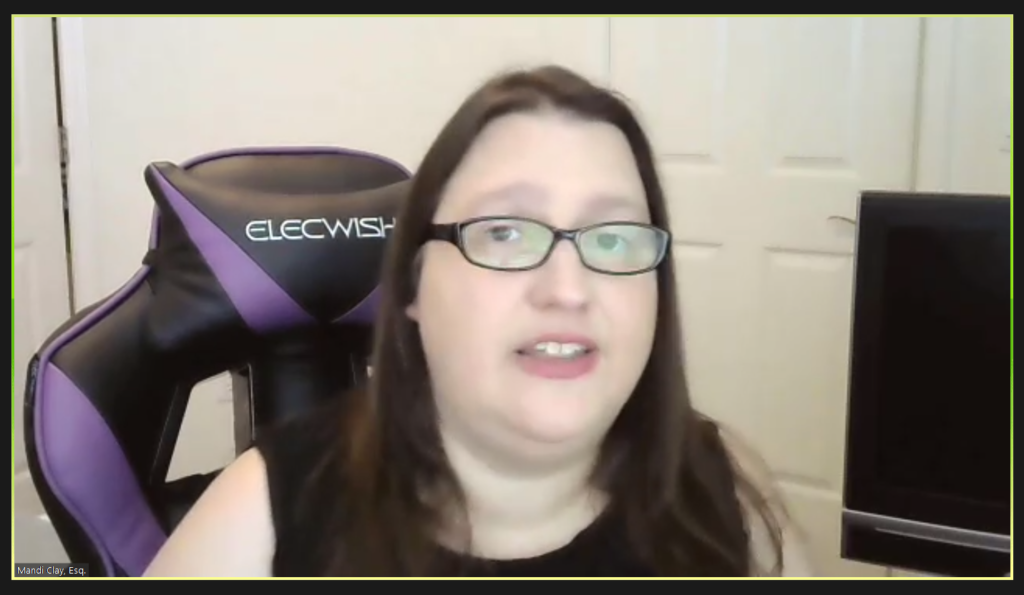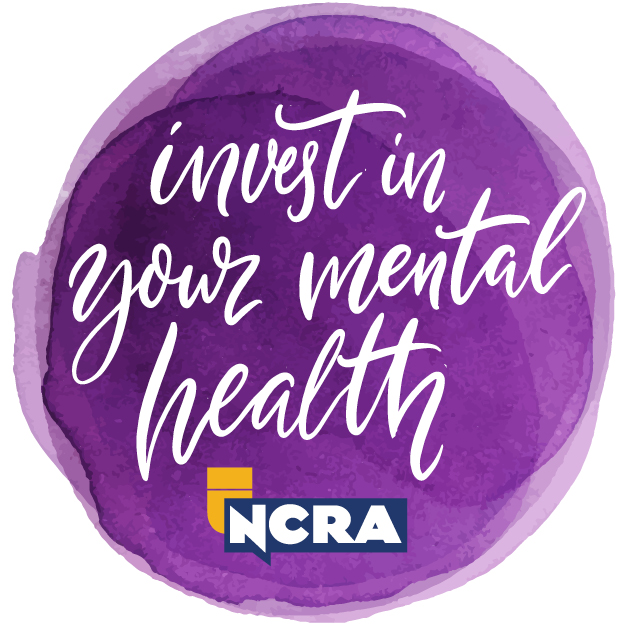
More than 400 NCRA members registered for a free lunch-and-learn on Sept. 8 that addressed mental health issues in court reporting. The one-hour live webinar, which was funded by the National Court Reporters Foundation, was held in conjunction with Suicide Awareness Week, which is observed Sept. 6 through 12.
Guest speaker Mandi Clay, Esq., an attorney from Tampa, Fla., covered the basics of depression and anxiety from a personal perspective. Clay shared her own story as a suicide survivor, discussed the signs and symptoms of depression, anxiety, panic disorder, and substance abuse, and offered advice on how to deal with issues you may have or issues that someone you know or work with might have. She told attendees that the goal of her session was to give a basic understanding of the difference between regular “stress” and mental illness and help them become comfortable when talking about these issues openly.
“This is something that I have carried my whole life,” Clay said about her mental health issues and suicidal thoughts. “It is not so much about being sad, but it’s that your brain is not working correctly. It’s not a question of if, but more of when and how you will be no more,” she added.

Clay said that those with mental health issues, especially those who experience suicidal thoughts, cannot explain to others what and why they feel the way they do and that using logic to help them does not help because it is a medical condition that requires professional treatment. She said the severity of mental health issues can range from mole hills to mountains and that everyone is different in how they deal with stress and other factors of daily life that can trigger a brain to not work correctly. What ties all mental health issues together though is that someone experiencing any level of mental health condition doesn’t have to live that way.
“Any of those positions you find yourself in, and for whatever reason, you can reach out for help and you should. If we can catch it early and learn coping mechanisms, then we can deal with it. If you don’t take small steps in the beginning, then you are going to end up in a medical or mental catastrophe.”
Advice Clay also shared with attendees included:
- It is OK to reach out for help. No matter what the issue is, never think it is not bad enough to ask for help.
- Mental health issues take the form of a wide range of symptoms and require different solutions.
- Quitting your job is not going to solve your mental health issues.
- If your mental health is interfering with your life, like not wanting to get out of bed, feeling anxious, depressed, or unable to cope through the day, seek help.
- If you or someone you know starts medication to help with symptoms, be sure to remain on that medication even if you feel better.
- Sometimes people with mental health issues don’t realize that what they are feeling when they are on medications is the normal way they should be feeling.
- Many things can trigger mental health issues such as traumatic events, substance abuse, and the impact of dealing with COVID-19.
- If you know someone who appears to be having mental health issues, talk to them about yourself first, including what you are feeling and if you have sought professional help from a therapist or even your primary care doctor.
- Check in with a professional on a regular basis whether it is weekly, monthly, or annually.
“For whatever reason, we have this stigma about mental health issues that goes way back in time. If someone today has Alzheimer’s, we don’t shame them today like we did years ago, because we recognize it is a disease. We aren’t there yet though with other mental health issues such as bipolar, compulsive disorders, anxiety, or depression,” Clay said.
“We can’t see that someone is color blind. But it is impossible for us to tell them what color is, and it is impossible for them to explain to us what they see. There are no words. We don’t disbelieve them or tell them to try harder. We understand that they see the world in a different way. That is what mental illness is. It is difficult for those with it to explain what they see, and that is the disconnect,” she added.
To provide members with additional mental health issue resources, NCRA has launched a Mental Health Resources page on its website that provides links to national mental health organizations, articles, and more. The page will continuously be updated with new information and will house the recorded webinar that took place on Sept. 8, which will be available to members on Sept. 10 on NCRA’s Mental Health Resources page.
In October, NCRF will be funding six more free webinars for NCRA members to mark Mental Health Awareness Week happening from Oct. 4 to 10. Details on these webinars including topics, speakers, and times will be announced in the JCR Weekly and in emails to NCRA members. The sessions will be recorded and housed on NCRA’s Mental Health Resources page.

